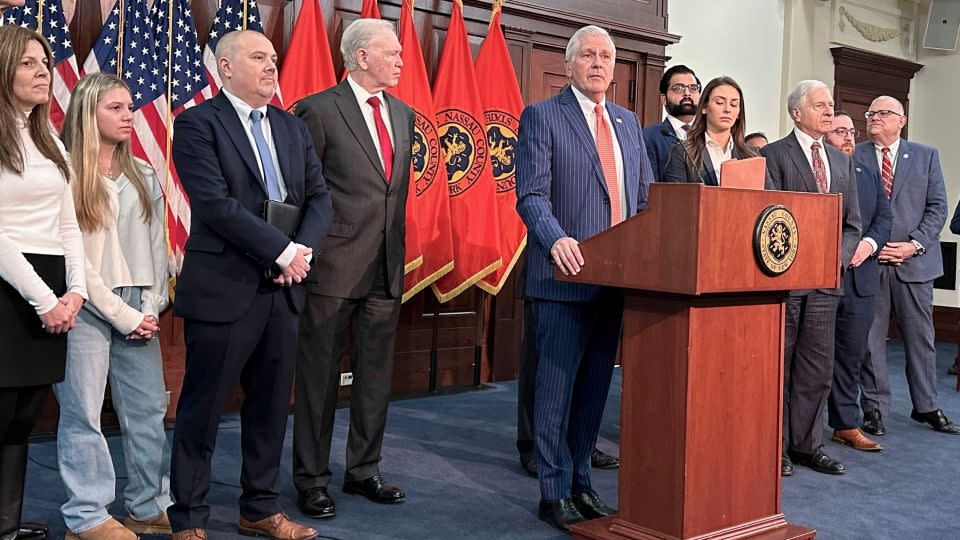NY AG, NYCLU sue county for again banning transgender girls and women from teams that match their gender identity

- Oops!Something went wrong.Please try again later.
New York’s attorney general and the local affiliate of the American Civil Liberties Union are both separately suing a New York county after it again banned transgender women from playing on female sports teams.
The new legislation affecting Nassau County facilities takes the place of an executive order recently struck down in a New York court after it was put in place in February. The Nassau County Legislature voted 12 to 5 to pass the new law in June.
Nassau County Executive Bruce Blakeman said he was disappointed New York Attorney General Leticia James was suing the county.
“I am very disappointed that the Attorney General would attempt to frustrate Nassau County’s desire to protect the integrity of women’s sports, ensure the safety of its participants and provide a safe environment for girls and women to compete,” Blakeman said Monday in a statement.
James’ suit says the Nassau County law violates New York State’s Human Rights Law and Civil Rights Law, in addition to violating Section 10 of the Municipal Home Rule Law. In a Monday news release, the attorney general said the new law mirrors the February executive order.
“Here in New York, every person has the right to be exactly who they are free from discrimination, and my office will always protect that right,” James said in the release.
According to the New York Civil Liberties Union, these laws provide “local governments with the power to adopt local laws so long as those local laws are ‘not inconsistent with any general law’ of the state.”
There are more than 100 county-owned athletic facilities in the Long Island county and in order to comply with the new law, those who want to participate or run leagues and teams “will be forced to make invasive inquiries about cis women and trans women’s gender identities alike, intrude upon their privacy and bodily autonomy, and ‘out’ people as transgender,” the civil liberties organization said in a news release Monday.
“We’re suing Nassau County – again – for their discriminatory law banning trans girls and women from participating in girls’ and women’s sports at county-run facilities,” the group posted on X. “The law is nearly identical to the County Executive’s order, which our lawsuit recently struck down.”
Judge struck down 1st order in May
In February, Blakeman signed an executive order that banned transgender women and girls from competing on female sports teams and leagues on county-owned facilities. The New York Civil Liberties Union filed a lawsuit in March on behalf of Long Island Roller Rebels, a women’s flat track roller derby league from Nassau County, arguing the county’s February executive order violated New York’s human rights law and civil rights law.
Nassau County Supreme Court Judge Francis Ricigliano struck down the order in May, saying Blakeman did not have the authority to issue it, according to court filings.
“NYCLU and the Long Island Roller Rebels won their first lawsuit and County Executive Blakeman’s transphobic executive order was struck down because it was blatantly illegal,” James said in her Monday release. “Now this discriminatory law must be as well.”
“Sports should be about challenging yourself and finding joy through movement,” Curly Fry, president of Long Island Roller Rebels said. “Trans people belong everywhere including in sports. Much like we defeated the transphobic executive order, we will fight this new law and ensure all community members can join a sports team and feel welcome.”
New York is among 25 states – including California, Georgia and New Jersey, that do not have statewide laws banning transgender students from competing on sports teams that align with their gender identities, according to data from Movement Advancement Project, a nonprofit think tank.
More than 20 states including Florida, North Carolina and Arkansas have passed laws that ban transgender people from playing on sports that align with their gender identity, the project’s data shows.
For more CNN news and newsletters create an account at CNN.com

